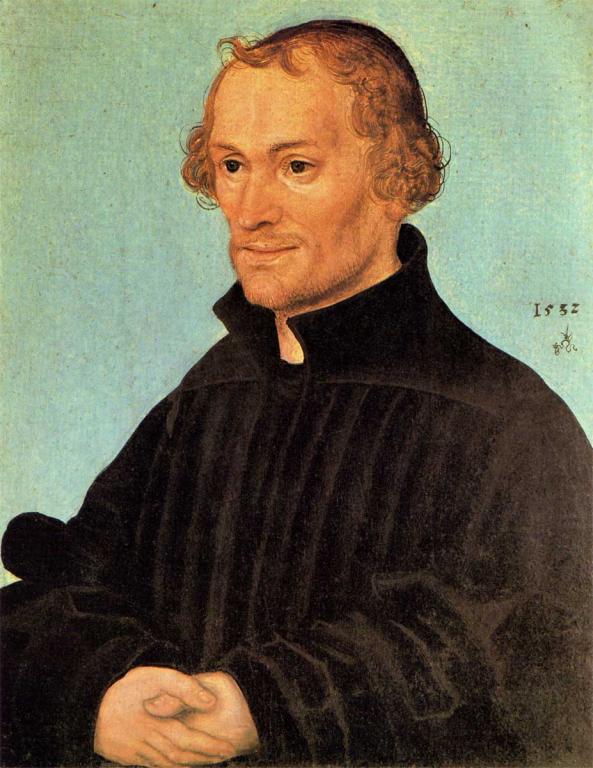
Philip Melanchthon (1497-1560) was Martin Luther’s best friend and successor as the leader of early Lutheranism.
I made the following comment:
As for Melanchthon’s “complexity”: yes, he sure was: a mild-mannered humanist who was too much of a wimp to even stand up to his friend Luther, yet who was in favor of killing peaceful Anabaptists, those who rejected the Real Presence of Christ in the Eucharist (the very belief that he himself later came to hold!), and those who held that some heathen might be saved. He described the Calvin-instigated burning of Michael Servetus as “‘a pious and memorable example to all posterity.” A very complex man indeed: and typical of the first generation of Protestants: not exactly renowned for their exceptional holiness, doctrinal orthodoxy or religious toleration.
I received some flak for this. I defend it in the following manner:
My intent and purpose in making my one paragraph “summary” of this “reformer’s” character was distorted by others. First of all, I didn’t claim in the first place that it was summing up the entire man or his character. Rather, it was a semi-sarcastic, critical remark about his “complexity” (i.e., including his ethical contradictions and unsavory behaviors).
Secondly, I either already have, or easily can, back up everything I wrote in that paragraph, with solid documentation: virtually all from Protestant or otherwise non-Catholic historians. I’ve already done that concerning his fascination with astrology. I’ve done it regarding his espousal of the death penalty for denial of the Real Presence in the Eucharist (and later adoption of the same condemned belief himself). The sources were impeccable.
For the latter, I heavily used, for example, Clyde Manschreck, the (Protestant) biographer of Melanchthon, right from his preface to his translation of Melanchthon’s own systematic theology (Loci communes), which has been in my own personal library for years. This is a serious citation. I amply proved my point from impeccable, solid academic, non-Catholic (so I won’t be accused of simply citing biased Catholics) sources.
Thirdly, Manschreck himself writes paragraphs that are arguably scarcely different from the one I wrote about Melanchthon, highlighting what I view as his glaring faults or questionable attributes. For example, in the 1985 Encyclopedia Britannica article on Melanchthon (also in my own library):
Succeeding generations have questioned Melanchthon’s approval of the death penalty for the radical Reformers, the Anabaptists, and an anti-Trinitarian, Michael Servetus; his approval of war to defend the Gospel; his condoning of polygamy for the English king Henry VIII and Philip the Magnanimous, landgrave of Hesse . . .
Note that this is five major “shots” at faults of Melanchthon, on one long sentence. It’s exactly the same as what I did, except that he was talking about how others (possibly including himself, but we can’t tell) questioned these aspects of Melanchthon, whereas I was speaking for myself: what I personally disapproved of. So how is it any different? If I am to be pilloried as an incompetent, profoundly-biased Catholic hack for my paragraph, why not also Melanchthon biographer Manschreck? I’ll even do a comparison:
A) Manschreck criticism of some of Melanchthon’s more glaring faults:
1. “Approval” of the death penalty for the Anabaptists.
2. “Approval” of the death penalty for Michael Servetus.
3. “approval of war to defend the Gospel”.
4. “condoning of polygamy for the English king Henry VIII”.
5. “condoning of polygamy for . . . Philip the Magnanimous, landgrave of Hesse”.
So we have capital punishment (twice), defending the gospel with physical violence, and polygamy (twice). Most folks today think this is pretty bad stuff. But I am tarred and feathered if I dare to bring this up or some similar thing. Here is what I claimed in my paragraph:
B) Armstrong criticism of some of Melanchthon’s more glaring faults (see the paragraph at the top):
1. He was a wimp with regard to standing up to Luther when necessary.
[nothing more than what Calvin repeatedly states in personal letters to him]
2. Approval of the death penalty for peaceful Anabaptists. [Manschreck’s #1]
3. Approval of the death penalty for rejection of the Real Presence of Christ in the Eucharist. [merely a variation of #2]
4. Later adoption of the same belief (denial of the Real Presence) that he earlier had people killed for. [an expansion of the sin of #3]
5. Approval of the death penalty for a belief that some heathen might be saved. [merely a variation of #2]
6. Approval of death penalty for Michael Servetus. [Manschreck’s #2]
So in my list we have approval of the death penalty (four times), later belief in a tenet for which he advocated a death penalty, and being a wimp, compared to Manschreck’s capital punishment (twice), war for the gospel, and condoned polygamy (twice). Where’s the beef? What’s this huge, chasm-like difference?
Then I added a general concluding statement: “typical of the first generation of Protestants: not exactly renowned for their exceptional holiness, doctrinal orthodoxy or religious toleration.” I had in mind mainly the Protestant leaders, and should have stated that. Their religious intolerance is undeniable, and is excoriated by many Protestant historians such as Roland Bainton and Philip Schaff. As a Catholic, I simply rendered my opinion that the early Protestants were not particularly more holy and righteous than the Catholics of the time, considered en masse. Melanchthon and Luther themselves make a host of statements about this. And I think I have offered ample historical proof in many papers.
I do this because the Protestant myth of origins always asserts that the Catholics were thoroughly corrupt and the Protestants were saintly “reformers” with only the highest motivations. But it’s fine and dandy for Protestants to harp on historical Catholic errors and sins till Kingdom come. If Manschreck says basically the same thing, it’s cool; no problem at all. But if I do it, it is Chicken Little. Certainly some remotely fair-minded, rational reader who is reading this can see the clear, blatant double standard here. It’s not rocket science.
None of this, therefore, should be in the least objectionable. Most of it has been casually stated (and decried) by Protestant observers such as Manschreck. It can all be proven. #1 is utterly obvious to all: all comment on Melanchthon’s “mild-mannered” personality. #2, #3, and #5 are all contained in the 1530 and 1536 “memoranda” written by Melanchthon and agreed-to and signed also by Luther. That is simply documented historical fact. So is #4. I documented that from Manschreck and other Protestant historians. It’s undeniable. #6 is historical fact. Melanchthon wrote it in a letter that we have. Everything is thus proven and indisputable. These are historical facts, not subjective mush.
I no more meant my paragraph as a summing-up of Melanchthon’s entire character than Manschreck did.
***
(originally 4-6-08)
Photo credit: Philipp Melanchthon (1532), by Lucas Cranach the Elder (1472-1553) [public domain / Wikimedia Commons]
***













